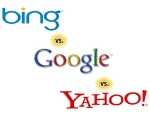Archive
VoIP: Vexed over Internet Phonecalls

Fighting for survival
A Titanic Greek drama is afoot, starring Google, Apple and the US’s FCC. As a corporate intrigue, it would be riveting enough on its own. But for added drama, it has at its heart a battle over one of the most disruptive technologies of our time: VoIP, the technology for making Internet phone calls.
The leading VoIP provider, Skype, was recently valued at £1.9bn in a part-sale by eBay. Whether it was worth that much is debatable- precisely because the revenue models of VoIP are great for users, but not so much for providers. Providing free phone calls brings in no revenue- which is the nub of the Google-Apple-FCC brouhaha.
Apple is accused of unfairly rejecting a Google application from its iPhone application store that would have enabled iPhone users to make free Internet phone calls. This would have meant lost revenue to AT&T, the phone company supporting the IPhone in the US.
On a larger scale, VoIP is a terminal threat to mobile service providers everywhere. Most ban the use of VoIP services on their networks. Resistance of course, is futile. As ubiquitous Wi-Fi allows users to access the web bypassing their phone companies, free phone calls will become the norm. They must adapt, or die.
Reach Out and Touch…

Technology you want to touch
Bill Gates isn’t given enough credit as a visionary. The mega geek has a surprisingly good record of successfully predicting technology innovations years in advance- no mean feat in such a fast-changing industry.
For example, as far back as 2001, billionaire Bill was predicting the dominance of tablet PCs, i.e. slate-like computers. He was much derided for his fixation over the years, but now he’s being vindicated.
The tech world is feverishly anticipating the coming of a tablet computer from Apple with the breathless fervour of Evangelicals awaiting the Rapture. Tablet computers are set to go mainstream.
But so what? The interesting underlying trend is what Mr Gates described as ‘natural interface’ computing. The idea is, computers will evolve so that we can relate with them in more natural ways that bypass the sterile mouse and keyboard.
Just as children enjoy finger-painting because our hands are our tactile connection to the physical world, we presumably want to touch our computers. Nothing proves this theory like the success of the iPhone and the current proliferation of similar touch-screen gadgets.
From this, we can extrapolate that the next wave of computing devices after the touch screen generation will be voice-activated. We will want to talk to our devices as well as touch them. Will they talk back?
Google: Better Mousetrap or Better Brand?

Best technology or best brand?
What is the world’s best search engine? You’d probably reply, Google. But is it really?
That reply is akin to saying that Coke is the world’s best soft drink or McDonald’s makes the world’s best hamburger. It’s the one you’re most likely to choose, but the best? Probably not.
This is the power of successful brands: by positioning in the public’s head as the preeminent choice, they generate loyalty out of proportion to their actual product superiority.
Google was recently adjudged the world’s most valuable brand. The Google logo itself is worth $100bn, because people are more likely to choose a product with the Google brand plastered across it, even when it isn’t significantly better than alternatives.
One informal way to test this is a search engine blind test. You enter a search term into the box, click it and three blind searches from Google, Yahoo and Microsoft’s Bing are displayed. You choose which you think is the best, and it then reveals the answers. They may surprise you.
Despite Yahoo’s assertion that it’s not a search engine, in our tests it consistently provided the best search results. Google was a distant second, with Bing dead last. Hardly scientific, but with Google holding 78% of US searches (to Yahoo’s 11% and Bing’s 8%), it is unlikely that this market dominance is explained solely by the superiority of Google’s product.
What did YOU find?
The End of Free Internet Stuff?

Endangered Species...
Free stuff on the Internet has been a proud and venerable tradition. Is this noble custom under threat?
The rise of the Internet decimated the ranks of all manner of traditional businesses. Just as record companies were settling into the sweet spot of selling high-margin CDs, music sharing networks turned digital piracy into an art form, and the public loved it.
Next to falter were traditional newspapers, gutted by the rise of free news websites. Now, no information industry is safe from the depredations of Internet Robin Hoods, who would take from the strategically flat-footed and give to the cheapskate.
The web offered the means to share information digitally, but legacy business models did not allow for online distribution. So people simply stole stuff and shared it in the cloud. Before long, it was essential to give content away for free merely to have a web presence.
But because content always cost money to create and publish, it was never really cost-free. The question was, who would have the courage to charge for it?
Premium publications like The Economist and the Wall Street Journal have been doing just that. Now, News Corp Emperor Rupert Murdoch signals that his online newspapers will stop giving away the goods . Despite skepticism about whether he can get away with it, the venerable Financial Times swiftly echoes the refrain.
Whatever has value can command a price- even on the Internet. The web may finally be growing up.
Yahoo! and Microsoft: Kissing Cousins

Signing the prenup.
What business is Yahoo in? No-one seems to be sure, least of all Yahoo.
After Carol Bartz took the helm at Yahoo last January, she soon realised that she too had no clue what business she was in.
Yahoo publishes news, offers e-mail, streams video, advertises jobs, provides web hosting, hosts photos, operates a search engine and a finance portal, and does basically everything including the kitchen sink.
However, Yahoo is not the best at anything, and suffers terrible internal cross-subsidies. It lacks strategic focus. It makes the bulk of its profits from displaying adverts to users of its sites, but vastly lags the more focused Google.
So Bartz followed the new CEO rulebook. She first moved the deck chairs around to seem busy and entrench her power. She then slashed the payroll. But cost cutting can only take you so far in the face of falling revenues. More was needed, so Yahoo revamped its home page. A deafening silence ensued.
So today, Yahoo announced that it will outsource its search advertising business to Microsoft. Yahoo saves the cost of running a search business, Microsoft gets search market share that brings it closer to Google and they split the revenue. The market was not impressed and the stock price fell by 12%.
With all the obvious ploys exhausted, Mrs. Bartz must now face the harder task of streamlining Yahoo’s disparate businesses, excelling in something and growing revenues. The clock is slowly ticking.
Microsoft: Strategy by Imitation

Google points the way for Microsoft
“Never interrupt your enemy when he is making a mistake“- Napoleon Bonaparte
There are many ways to develop strategy. Someone should teach Microsoft a few of them.
Napoleon’s timeless aphorism suggests that whatever you do, blindly imitating your competitors cannot be considered strategic best practice. In fact, you may just find yourself doing precisely what they want you to do.
Ever since Bill Gates left Microsoft, the once-mighty eater of rivals has floundered as the Internet undermined its PC and server-based business models. Its strategic response has been simple: look at what competitors are doing, and despite differences in resources, focus, expertise and markets, just copy them. It’s much easier than thinking through evolving customer needs.
Since Apple had an iPod, Microsoft released the Zune, a device completely unrelated to its core software competence. Failure was the swift result. Since Apple was famed for its physical stores, Microsoft opened physical stores, despite already having established sales channels. Since Google has a stand-alone search engine, Microsoft launched one, or two, before settling on Bing.
The latest move may be the worst of all. MS Office is Microsoft’s most profitable product along with Windows. People pay for it, and like doing so. However, Google has a free online suit, so Microsoft will now offer Office online for free. The fabric of the universe is rent asunder by the sound of billions in revenue evaporating into the cloud.
Google makes money from advertising. It can afford to give away free spreadsheets. Microsoft cannot. Nor does it need to- we would gladly have paid for the online version of Office. Google must be delighted. Their enemy is making a mistake.
Breaking Wind: The Cost of Clean

Breaking wind responsibly
Do you care for the fate of the environment? Do you love the Earth? Well, how much would you pay to save her?
Most people have no clue about the exact nature of the climate crisis. The details are too boring. It is enough for them that supporting ‘the environment’ feels good, is cool, and doesn’t cost them too much.
They’re content with the frisson of delight they get from sorting their trash into the proper green bins, and the virtuous thrill of refusing a plastic bag at the supermarket checkout.
When it comes to shelling out real cash to save the planet however, people are not quite so enthusiastic. It’s the reasoning behind why many people don’t vote: how are you sure your little effort will make a difference? And besides, it’s no fun saving the planet if no-one can see you doing it. You can’t boast to your neighbours about your higher heating bills, for instance.
Which is precisely what you will get if the UK government has its way. Demand and price should determine which technology wins out. But our omniscient leaders have decided that it is to be wind, and so be it. And the cost of ramping up investment in windmills will mean customers pay over £200 more annually for energy. It’s easy to make policy other people pay for.
In America, where people are less tolerant of politicians telling them what to do, President Obama is having to water down his own sanctimonious energy bill. Apparently, even Democratic voters would rather sort their trash than pay higher bills.
Business Bloodsports: Google vs. Microsoft

Microsoft and Google get dirty
In the blue corner is Microsoft.
This veteran bruiser decimated all comers in the PC software wars. Contenders like Wordstar and Lotus 1-2-3 died under the ruthlesss fists of MS Office. Operating systems fell to the bloodlust of Windows. Novell and Sun lost their lives in the network and server arenas.
And when the Internet arose as the new battlefield, Netscape’s pioneering browser went to the graveyard as Internet Explorer took no prisoners. As the dust settled, Microsoft stood triumphant.
And then the Internet’s open architecture threw up all manner of upstarts, most notably today’s challenger: Google. They popularised a way to search the web, and raked in the billions. An ageing Microsoft was caught flat-footed.
But Google was not done. Determined to dethrone the champion, they launched Google Apps, and online suite to challenge Office. They launched Chrome to challenge Internet Explorer in concert with an allied army of browsers.
Microsoft reeled, and desperately agreed to put Office on the web to counterstrike Google Apps. Then they relaunched their own search engine, Bing, and managed to stun Google with the sucker punch. The champion seemed formidable one more.
But Google would not be denied the title. Today, they launched a blow at the vital underbelly of Microsoft: a PC operating system targeted at the new class of internet computers called netbooks. Buy your tickets. This will get interesting…
The Apple of our iPhone

....and it cures cancer too!
Apple is one of the great business stories of our time. We now wonder whether it will have a happy ending.
A couple of weeks ago, we poked happy fun at the cult-like devotion of many Apple customers. But satirical chiding apart, most companies would give much to enjoy such fanatical customer loyalty. But the thing with religions is, they need a Messiah. And Apple may have lost its own.
The last time Steve Jobs left Apple, in 1985, the company barely survived his exit. The MBAs were let loose on the company like a pack of hell hounds, and the result was total disaster: a degradation of the brand, proliferation of product lines, and a loss of the exclusive, premium positioning Jobs had envisioned for the brand.
He returned triumphant in 1996, resurrected the moribund business, parted the Red Sea, and the rest is iPhone, iPod, iTunes and Mac Air history. A creative perfectionist, Jobs’ Apple was one where fanatical devotion to design and quality justified a premium price. He has barely been gone 6 months and already the MBAs are out of their cages, undoing his fine work.
There’s a fine line between premium pricing and rip-off pricing, and Apple may have crossed it. The new version of the iPhone, the so-called iPhone 3G s is awkwardly-named, deficient in features (lacking for example multitasking ability and sporting a decidedly retro 3 mega-pixel camera) and partly due to the depredations of cellphone carriers, scandalously expensive.
The faithful are not amused. Competition has intensified, and the halo is fading. Touchscreens are now a dime a dozen. The old, long lines are much shorter. Most of all, the release of a cheap $99 iPhone fatally damages the exclusive cachet of the brand. Apple was cool precisely because everybody couldn’t afford one.
Will there be a Third Coming of Jobs. With his health unstable, who knows? But if he’s planning to descend from on high to save the day once more, he’d better come quick.
Digital Brigands and Tax Addiction

Just one more tax hike and I'll quit, I swear!
How do you wean an addict off a dangerous and deepening addiction? Some say a violent and sudden withdrawal is best, while others counsel a gradual disengagement from the addictive substance.
What if the addict is the government, and the addiction is tax revenue and market meddling? It is certainly an exhilarating combination. With the power to tax and spend comes the opportunity to engage in all sorts of fun projects at the public’s expense. And best of all, they have no choice but to pay up.
For example, Digital Britain is the catchy monicker for the Interferers’ new project to give everybody broadband access whether they like it or not. Naturally, it is financed by a new tax. Which means the government taxes money from people, and uses it to provide services they could have easily purchased themselves without incurring the cost of a middleman government bureaucracy.
Expectedly, this massive cross-subsidy is described as a philanthropic mission to rival the curing of cancer. Who could oppose the provision of Internet access to rustic paupers who wouldn’t have a clue what to do with it? Well, we could. It is unnecessary. If this were left to the market, the price and penetration of broadband service would reflect the value people place on it, and how much they can afford to pay for it.
Prices would converge at equilibrium, ensuring the maximum penetration consistent with demand. Competition would keep efficiency high and equilibrium prices low. In short, broadband would spread in the most efficient and effective way. Best of all, we wouldn’t have to pay yet another tax to the revenue addicts, now salivating eagerly at the chance to get their grubby claws on even more of our hard-earned cash.
This is not abstract economic theory we are spewing. In America, the Pew Research Centre’s 2009 report on home broadband penetration shows adoption growing healthily despite the recession(up 8% over 2008), and without government meddling and subsidy. Best of all, adoption is growing fastest among the elderly and the poor- the same people the UK’s pro-meddling apologists claim to be protecting.
The report also reports that prices are lowest in those US regions with the greatest competition amongst broadband prividers. Proof positive that the market works. It is a beautiful thing. It does the job swiftly, efficiently and cleanly. Which is why the revenue addicts in governments should be forced to go cold turkey.
